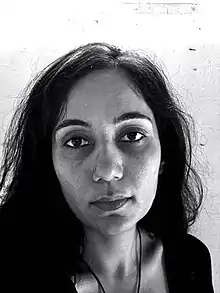Gauri Gill
Gauri Gill (born 1970) is an Indian contemporary photographer who lives in New Delhi. She has been called "one of India's most respected photographers" by the New York Times[1] and one of "the most thoughtful photographers active in India today" in The Wire.[2] In 2011 Gill was awarded the Grange Prize, Canada's most prestigious contemporary photography award.[3] The jury said her works "often address ordinary heroism within challenging environments depicting the artist’s often-intimate relationships with her subjects with a documentary spirit and a human concern over issues of survival."[4]
Gauri Gill | |
|---|---|
 | |
| Born | 1970 (age 50–51) |
| Nationality | Indian |
| Education | College of Art, Delhi University, Parsons School |
| Alma mater | Stanford University (2002) |
| Known for | Photography |
Education and early life
Born in Chandigarh, India, Gauri Gill received her BFA in Applied Art at the Delhi College of Arts in New Delhi, India. She earned her BFA in Photography at the Parsons School of Design, New York in 1994, and MFA in Photography at Stanford University in 2002.[5]
Work and career
In The Americans (2000-2007) she photographed her family and friends across the Indian diaspora in America.[6]
A decade-long study of marginalized communities in rural Rajasthan called Notes from the Desert (1999 –ongoing) has resulted in individual exhibitions and projects such as The Mark on the Wall, Jannat, Balika Mela, Birth Series and Ruined Rainbow.[7] Of this work, she says, "The girls who come to the fair have an urge to know. Those who stepped into my photo tend also wished to portray themselves, as they are, or as they see themselves, or to invent new selves for the camera. Their attempts may have been tentative or bold, but this book may be seen as a catalogue of that desire."[8]
The 1984 notebook (2005- 2014) is an example of collaboration and ‘active listening’, and of using photography as a memory practice.[9][10]
In January 2007, along with Sunil Gupta and Radhika Singh, she co-founded and edited Camerawork Delhi a free newsletter about independent photography from New Delhi and elsewhere.[11]
In 2011 she won the Grange Prize, Canada's most prestigious contemporary photography award.[12][13][14]
In 2012, she curated a major exhibition called Transportraits: Women and Mobility in the City investigating safety and experiences of women on the streets.[15]
Since 2013, she has collaborated with Rajesh Vangad, a renowned Warli artist, on Fields of Sight, combining the contemporary language of photography with the ancient one of Warli drawing to co-create new narratives. .[16]
References
- Roy, Nilanjana S. (3 August 2010). "Fighting for Safe Passage on Indian Streets". The New York Times. ISSN 0362-4331. Retrieved 4 March 2016.
- Adajania, Nancy. "Bearing Witness". Archived from the original on 5 May 2016.
- "Grange Prize".
- "Grange Prize Citation".
- "Stanford University".
- Gauri Gill; Bose Pacia; Nature Morte Gallery; Matthieu Foss Gallery; Stanford Art Gallery; Chicago Cultural Center (2008). Gauri Gill: The Americans. Nature Morta.
- "Review: Photography exhibitions from India and Mideast". www.mercurynews.com. Retrieved 4 March 2016.
- "Blouin Artinfo on Gauri Gill".
- "Thomas Bernhard in New Delhi - NYTimes.com". mobile.nytimes.com. Retrieved 4 March 2016.
- "Tehelka - The People's Paper". archive.tehelka.com. Retrieved 4 March 2016.
- "Photo Ink".
- "Gauri Gill wins 2011 Grange Prize". National Post. Retrieved 4 March 2016.
- "Stanford Magazine - Article". alumni.stanford.edu. Retrieved 4 March 2016.
- "Indian artist Gauri Gill wins $50,000 Grange Prize for photography". www.winnipegfreepress.com. Retrieved 4 March 2016.
- Roy, Nilanjana S. (3 August 2010). "Fighting for Safe Passage on Indian Streets". The New York Times. ISSN 0362-4331. Retrieved 4 March 2016.
- Jack, Ian (23 January 2015). Granta 130: India: New stories, mainly true. Granta. ISBN 9781905881864.